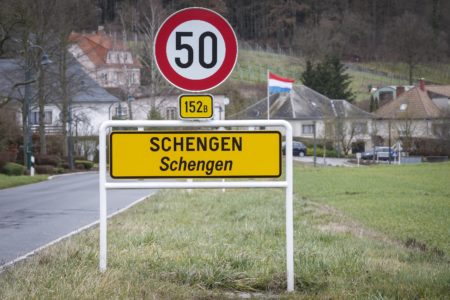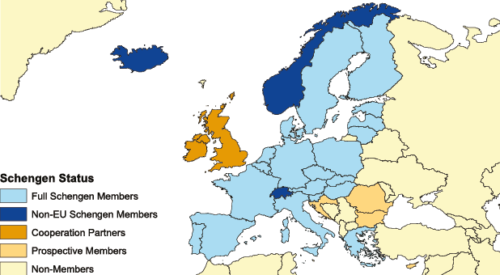Have You Ever Really Loved the Border?
Time to Expand the Schengen Area

Source: New Europe
Schengen, a small commune in Luxembourg bordering Germany and France, is one of those mysterious places that has been on the lips of so many Europeans at least once in their lifetime. Although, I must admit I probably do not know anyone that has actually visited the place. The term Schengen has been used frequently as a bargaining chip in EU politics; ranging from dry Commission statements and nationalist blackmails, to being a regular part of debates in the European Parliament and Strasbourg taverns.
Bearing in mind the different connotations that the word can cause (i.e. the visa regime), this time I will focus only on the Schengen agreement as such, which created an area almost jeopardised 30 years later with the European migrant crisis. Now, with a view of careful optimism, I believe the time has come for Schengen to expand. Post 2015, Schengen has been called into question for so many times, especially from anti-EU politicians that would welcome its disruption. Nevertheless, it is still here today and will stay for years to come.
With this sense of negativity hopefully behind us, Euro enthusiasm has returned to many of the EU Member States. The economy is performing well, optimism is growing among citizens and many EU pundits are amused by the weakness of Theresa May in the Brexit talks. On this note, the European Parliament has (December 13th) decided to discuss the issue of expanding the Schengen Area during its last plenary session of 2017.
The countries that were discussed as potential members of the Schengen Area included Bulgaria, Romania and Croatia. Bulgaria and Romania have been in the waiting room for many years, while Croatia still needs to address certain challenges in order to be fully capable of entering. The countries received strong support from mainstream political groups, while Dimitris Avramopoulos, Commissioner on Migration, Home Affairs and Citizenship, welcomed the discussion and expressed his confidence that the matter will soon be resolved.
Regarding the Commission, President Jean Claude Juncker explicitly expressed his support for Bulgaria, Romania and Croatia in his State of the Union speech in September. Bulgaria and Romania have met the technical requirements to join Schengen years ago. These requirements include an advanced border check, investments in police forces, cooperation and everything one sees when crossing the Schengen border.
However, the final decision lies with Council, and so far some Member States have decided to veto such a decision due to a variety of internal reasons. Therefore, it is an entirely political decision. As Bulgaria is taking the EU presidency from the 1st of January, it is obvious that this cannot be done during their tenure. Romania is taking the EU presidency exactly a year later, from January 2019. However, between the Bulgarian and the Romanian presidencies there is an ideal opportunity provided by the Austrian one.
Regarding Croatia, the country is expecting to fulfil all the Schengen criteria by the end of 2018. In seeing this through, a perfect opportunity to enter Schengen would arise immediately after Brexit, alongside the EU Summit in Romania planned for May 9th 2019, around the time of the EU elections. An ideal scenario for many pro-Europeans would be to immediately respond to Brexit with more Europe.
Finally, I would like to mention some additional arguments as to why the Schengen Area should be expanded. Although solidarity has strongly returned into the EU discourse in the past ten years, I would rather lead with symbolism, the same symbolism from which the Parliament debated the Schengen issue. I have written some months ago how symbolic moves can have an adverse impact on the EU project, with specific reference to the so-called “new” Member States.
The notorious case of double standards of food in Eastern Europe shows us how the issue can be manipulated by populists and anti-EU forces. The recent decision to move two EU agencies to Paris and Amsterdam, as well as the failure of the tactical candidacy of Slovak Finance Minister Kazimir for the Eurogroup presidency, was not received well amongst the “new” members, and I think everyone is aware of that.
If President Emmanuel Macron or Chancellor Angela Merkel want to foster integrative and pro-EU policies, then I do not see a problem with letting Bulgaria and Romania enter the Schengen zone in 2018. It would promote the European spirit in these countries and give them well-deserved satisfaction. To conclude, I do not see the validity of criticisms aimed at rule of law when, at the same time, we have actual Schengen members being accused of such violations, but without facing concrete measures. All I can say is that I truly hope that this issue will be resolved before the European elections, in order to demonstrate strong symbolism of a post-Brexit Europe united in diversity.

Source: Voxeu.org
